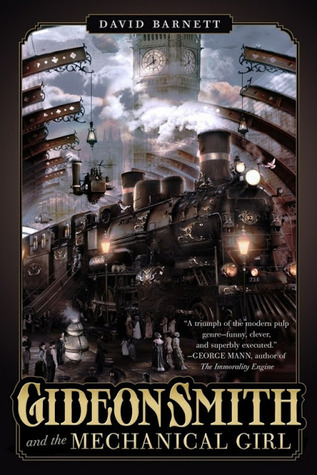The premise of this novel is that in 1890 the British Empire, ruled by Queen Victoria, controls much of the world with its massive air fleet and mechanical marvels. It even includes parts of North America, which have remained in British control since the failed revolution of 1775, although several other powers such as France, Spain, and Japan have all staked out spheres of influence. Defending this ever-expanding empire is the glorious hero, Captain Lucian Trigger, and his band of colorful companions who go on rollicking adventures to protect the empire and vanquish its foes.
Gideon Smith is young fisherman in a village of coastal England, but his dreams of a greater life are fueled by tales of Captain Trigger's adventures. When the crew of his father's fishing boat go missing, Gideon suspects foul play and heads for London to seek the aid of his hero, meeting a number of interesting characters along the way. Gideon is soon thrust into events well over his head and finds himself engaged in his own adventure.
Overall the premise is very solid. Drawing very heavily on pulp adventures and utilizing an everyman perspective character, Barnett sets us up for a grand adventure and he certainly delivers. What is most frustrating for me is that while Barnett creates great possibilities for exploring a very different political and social landscape of America, almost all the action occurs in England where the political fabric remains the same. In a world of grand adventure, most of the action takes place in an area fairly familiar to any reader of nineteenth century literature. Yes, there are new technological marvels galore, with dirigibles and steam driven cabs in the hive of London, but politically it remains the same. When this world seems very closely related to our own, it would have been a great opportunity to see how this very different technology could have affected Britain's social, political, and economic fabric.
The reason I say that this world seems so closely related to our own was the prevalence of certain historical characters that either served a major part in the plot or were tangentially mentioned. The historical figures of Bram Stoker, Hermann Einstein, Vlad Dracula, Jim Bowie, and Elizabeth Bathory, are tied in somehow to the plot. Granted some have a much greater role, and they are all rather changed from real life, but the novel is shaped by people we know from our own world. In addition, slight references are made to works such as H.P. Lovecraft's body of writing and the adventures of Indiana Jones, which further tie this alternate universe to ours. And this is where I get conflicted with the novel because with all these connections and webs between famous figures, it makes the world feel much smaller and like the world belongs to only a handful of special people. Yes, Gideon our everyman protagonist is a nobody from nowhere who has become elevated because of a combination of chance and his willingness to do what it takes, but it makes me feel like only a select few people can travel in the realm of heroes because they have something special about them. It makes this world of adventure feel smaller and walled off, forbidden to the majority of us.
My other big issue was how Maria, the titular Mechanical Girl of the novel also gets treated. I wish to avoid spoilers for my gentle readers, but let us just say that poor Maria suffers from quite a few frustrating and institutionally sexist tropes as a character. I certainly would not claim that this was any overt attempt of the author, as I have pointedly said at various points in previous reviews, but I continue to be frustrated that such tropes continue to circulate within the medium of fiction.
Gideon Smith and the Mechanical Girl is certainly a well-written adventure and quite enjoyable, but as I said there are certain issues which make the book feel much smaller than a world of grand adventure and unfortunate usage of harmful tropes. The ending was left very open and the possibility of a sequel is certainly there, with the tantalizing promise of a look at a changed America, but that will remain unresolved for now. If you're hard-up for a steampunk adventure than you could certainly do worse, but I'm sure you could do much better as well.
- Kalpar


No comments:
Post a Comment